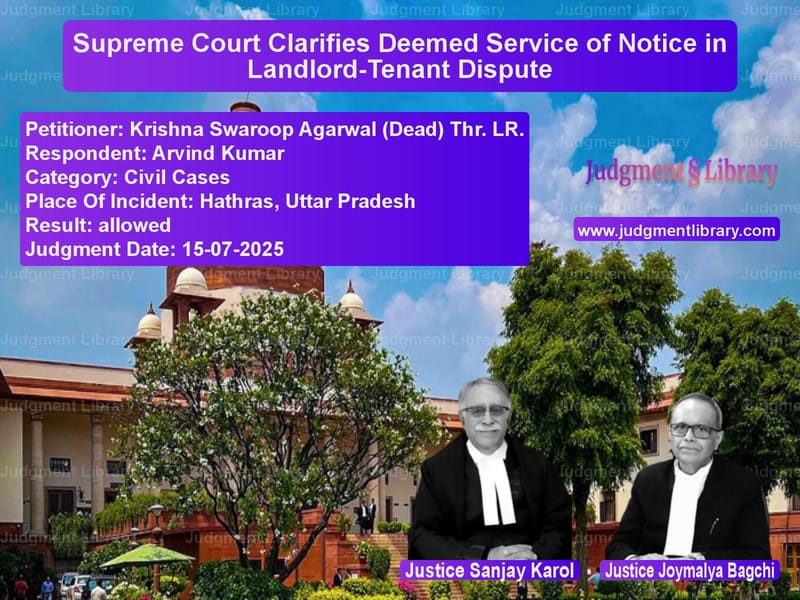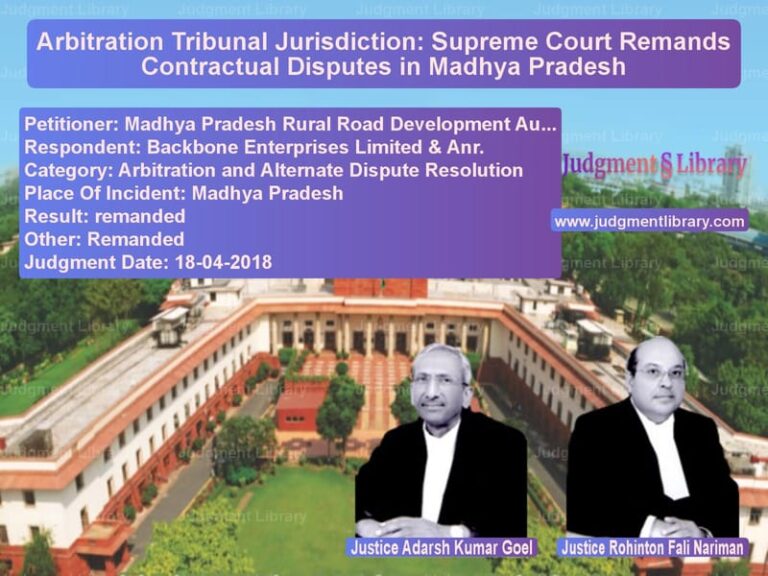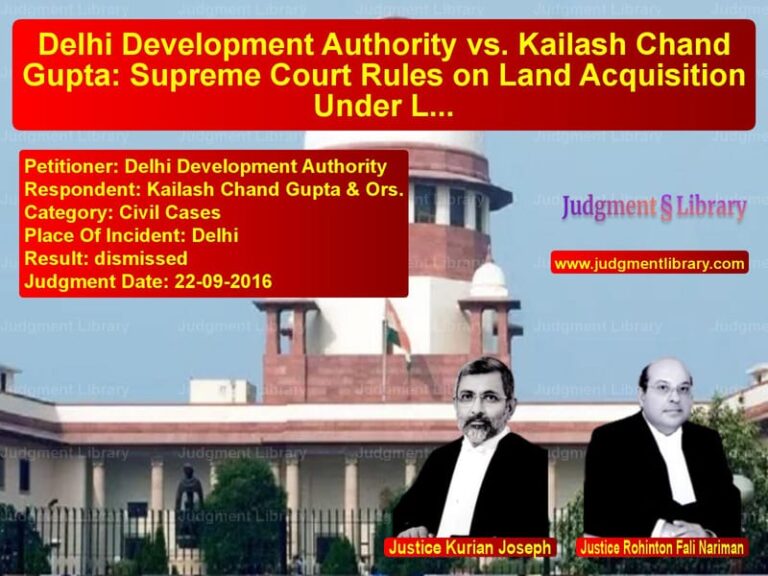Supreme Court Clarifies Deemed Service of Notice in Landlord-Tenant Dispute
In a significant ruling that clarifies the legal position on service of notice in landlord-tenant disputes, the Supreme Court of India has restored an ejectment decree that was set aside by the High Court on the ground of improper service of notice. The case of Krishna Swaroop Agarwal (Dead) Thr. LR. versus Arvind Kumar, decided on July 16, 2025, revolves around a fundamental question of law: whether a notice sent by registered post but returned with the endorsement ‘ND’ (Not Delivered) can be considered as valid service under the law. This judgment reinforces the legal principle of ‘deemed service’ and provides important guidance on how courts should interpret such situations in tenancy matters.
The dispute began when the appellant landlord filed a suit for ejectment and recovery of arrears of rent against the respondent tenant. The tenant had taken the suit property located at Sadabad Gate, Agra Road in Hathras on rent at Rs. 3,000 per month, including water tax and house tax. The tenancy began from the first date of the English month and ended on the last date of the same month. The tenant failed to deposit the rent for the period from June 1, 1999, to September 11, 2000, totaling Rs. 38,416 along with Rs. 3,841 towards water tax and Rs. 3,841 towards house tax. Due to this default in payment, the appellant issued legal notices dated September 12, 2000, and November 1, 2000, through Registered A.D. Post, asking the tenant to make good the default, deposit the outstanding amount along with interest, pay expenses towards legal notice, and hand over vacant possession of the suit property.
The proceedings before the Civil Judge in Hathras began on December 6, 2000, and summons were issued to the respondent on February 12, 2001. However, no appearance was entered by the tenant. On April 13, 2001, it was recorded that the service through the Registry was deemed sufficient, and the proceedings against the respondent would continue ex-parte. The case saw numerous delays and procedural applications over the years. The tenant filed various applications, including one under Order IX Rule 7, claiming that he had to rush to Agra due to a medical emergency on the day his right to file a written statement was closed. However, the Court refused to accept this contention, noting that service of notice was completed on April 13, 2001, yet as of October 27, 2004, the tenant had not filed his counterclaim or written statement.
During the proceedings, there were claims of an ‘Out of Court Compromise’ between the parties, with the tenant submitting that amounts due until October 2005 stood paid, and only five months’ rent remained outstanding. The Court offered the tenant an opportunity to save himself from eviction by paying Rs. 300 as costs to the landlord and depositing the remaining amount in Court. However, the tenant sought adjournments and filed revision petitions instead of complying with the Court’s directions. Ultimately, the suit was decreed on May 27, 2011, and a corresponding decree was passed on November 26, 2011, directing the tenant to vacate the disputed property and hand over peaceful possession to the landlord within one month, along with depositing the entire amount of rent due from June 1, 1999, and mesne profit at Rs. 2,500 per month with 9% per annum interest.
The High Court’s Decision and Legal Challenge
The tenant challenged the Trial Court’s order and decree before the High Court, invoking its revisional jurisdiction. The primary argument raised by the tenant was that the notice terminating tenancy under Section 106 of the Transfer of Property Act, 1882, was not served upon him. He contended that the findings returned by the Trial Court were perverse because the Court had observed that service through registered notice was sufficient even when the same was returned by the postal department with the endorsement ‘ND’. The High Court, in a short order, accepted this argument and set aside the ejectment decree. The High Court held that “when a document was not delivered by the Postal Department and it was not on account of revisionist or that he avoided service, it could not have been said that notice was served upon defendant-revisionist.” The High Court further stated that “the decree of eviction could not have been passed and cannot be sustained” in these circumstances.
The High Court specifically addressed the interpretation of the postal endorsement ‘ND’, noting that “the words ‘ND’ cannot be read as ‘Not Claimed'” and that during the course of arguments, it was admitted that ‘ND’ denotes ‘Not Delivered’. Based on this interpretation, the High Court concluded that since the document was not delivered by the Postal Department and there was no evidence that the tenant had avoided service, the notice could not be considered as served.
The Supreme Court’s Analysis and Legal Principles
The Supreme Court, in its judgment, took a completely different view from the High Court and emphasized the importance of the legal concept of ‘deemed service’. The Court began its analysis by referring to Section 27 of the General Clauses Act, 1887, which deals with service by post. The section states: “Where any Central Act or Regulation made after the commencement of this Act authorizes or requires any document to be served by post, whether the expression ‘serve’ or either of the expressions ‘give’ or ‘send’ or any other expression is used, then, unless a different intention appears, the service shall be deemed to be effected by properly addressing, pre-paying and posting by registered post, a letter containing the document, and, unless the contrary is proved, to have been effected at the time at which the letter would be delivered in the ordinary course of post.”
The Court extensively discussed the concept of deemed service through various precedents. In M/s. Madan and Co. v. Wazir Jaivir Chand, which concerned the payment of arrears of rent under the J&K Houses and Shops Rent Control Act, 1966, it was observed that “in order to comply with the proviso, all that is within the landlord’s domain to do is to post a pre-paid registered letter containing the correct address and nothing further. It is then presumed to be delivered under Section 27 of the GC Act. Irrespective of whether the addressee accepts or rejects there is no difficulty, for the acceptance or refusal can be treated as a service on, and receipt by the addressee.”
The Court also referred to C.C. Alavi Haji v. Palapetty Mouhammed & Anr. in the context of Section 138 of the Negotiable Instruments Act, 1881, where it was held that “when the payee dispatches the notice by registered post, the requirement under Clause (b) of the proviso of Section 138 of the NI Act stands complied with and the cause of action to file a complaint arises on the expiry of that period prescribed in Clause (c) thereof.” This principle was followed in Vishwabandhu v. Srikrishna, where summons issued by Registered AD post was received back with endorsement ‘refusal’. The Court held that in accordance with Sub-Rule (5) of Order V Rule 9 of CPC, refusal to accept delivery of the summons would be deemed to be due service in accordance with law.
The Supreme Court noted that similar positions have been adopted in various other judgments, including Greater Mohali Area Development Authority & Ors. v. Manju Jain & Ors., Gujarat Electricity Board v. Atmaram Sungomal Posani, CIT v. V. K. Gururaj, Poonam Verma v. DDA, Sarav Investment & Financial Consultancy (P) Ltd. v. Lloyds Register of Shipping Indian Office Staff Provident Fund, Union of India v. S.P. Singh, Municipal Corpn., Ludhiana v. Inderjit Singh, and V.N. Bharat v. DDA.
The Supreme Court’s Final Ruling
After analyzing the legal principles and precedents, the Supreme Court held that “the High Court was plainly in error in coming to this conclusion.” The Court emphasized that “the impugned order was passed without consideration of Section 27 of GC Act, which provides that if services are made through Registered Post, it is deemed to have been made in accordance with law.” The Court noted that undisputedly, notice was sent to the respondent by Registered Post in compliance with Section 106 of the Transfer of Property Act, and therefore, the deemed service principle should have been applied.
The Supreme Court also examined the scope of revisional jurisdiction, referring to Ram Murti Devi v. Pushpa Devi, which discussed the power of revision with reference to Hari Shankar v. Rao Girdhari Lal Chowdhury. The Court cited the observation that “instances which readily occur to the mind are cases in which the Court which made the order had no jurisdiction, or in which the Court has based its decision on evidence which should not have been admitted, or cases where the unsuccessful party has not been given a proper opportunity of being heard, or the burden of proof has been placed on the wrong shoulders.” The Supreme Court found that none of these basic criteria were met in the present case, and the High Court’s order did not speak of any other reason or circumstance that compelled the Court to exercise its power under the CPC.
In its final ruling, the Supreme Court stated: “In that view of the matter, the appeal succeeds, and it is, accordingly, allowed. The ejectment decree passed by the Trial Court in S.C.C. Suit No.23/2000 is restored.” The Court directed the tenant to “hand over vacant and peaceful possession of the suit property to the landlord within three months from the date of communication of this judgment.” Within the same time frame, the tenant was also directed to “clear all arrears of rent/occupational charges, mesne profit as also arrears of tax (water, house or otherwise).”
This judgment reinforces the legal principle that when a landlord sends a notice through registered post to the correct address of the tenant, the service is deemed to be effective under Section 27 of the General Clauses Act, regardless of whether the notice is actually delivered or returned with endorsements like ‘ND’. The ruling provides clarity and certainty to landlords who often face difficulties in serving notices to uncooperative tenants and ensures that technical objections regarding service of notice do not defeat the substantive rights of parties in landlord-tenant disputes.
Petitioner Name: Krishna Swaroop Agarwal (Dead) Thr. LR..Respondent Name: Arvind Kumar.Judgment By: Justice Sanjay Karol, Justice Joymalya Bagchi.Place Of Incident: Hathras, Uttar Pradesh.Judgment Date: 15-07-2025.Result: allowed.
Don’t miss out on the full details! Download the complete judgment in PDF format below and gain valuable insights instantly!
Download Judgment: krishna-swaroop-agar-vs-arvind-kumar-supreme-court-of-india-judgment-dated-15-07-2025.pdf
Directly Download Judgment: Directly download this Judgment
See all petitions in Landlord-Tenant Disputes
See all petitions in Property Disputes
See all petitions in Contract Disputes
See all petitions in Debt Recovery
See all petitions in Specific Performance
See all petitions in Judgment by Sanjay Karol
See all petitions in Judgment by Joymalya Bagchi
See all petitions in allowed
See all petitions in supreme court of India judgments July 2025
See all petitions in 2025 judgments
See all posts in Civil Cases Category
See all allowed petitions in Civil Cases Category
See all Dismissed petitions in Civil Cases Category
See all partially allowed petitions in Civil Cases Category







